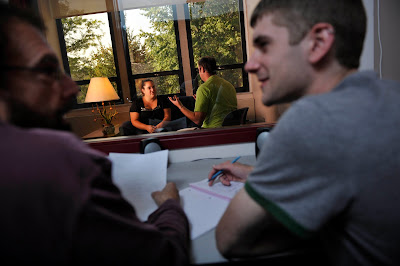Pitt-Bradford Introduces
New Minor in Counseling Psychology
 The University of Pittsburgh at Bradford has introduced a new minor in counseling psychology that will give students an edge entering the job market.
The University of Pittsburgh at Bradford has introduced a new minor in counseling psychology that will give students an edge entering the job market.Dr. Gregory Page, associate professor of psychology, said that many of the university’s graduates in the behavioral sciences go into jobs that involve counseling-related skills. The new minor not only gives students more experience in this area, it also makes it easy for future employers to tell at a glance that they have relevant experience in counseling.
That’s especially important for graduates from majors other than psychology but who compete for some of the same jobs, such as sociology, criminal justice and human relations.
Page said he worked with Dr. Michael Stuckart, associate professor of anthropology, Dr. Warren Fass, associate professor of psychology, and Dr. Bernie Meyer, associate professor of criminal justice, to design the 22-credit minor.
The minor includes counseling-related courses in sociology as well as Abnormal Psychology, a class and laboratory in Counseling Psychology and an internship in a counseling setting.
In the counseling course, students learn about counseling theories, counseling skills, professional issues such as ethics and professional identity, and about different clinical settings before engaging in mock counseling in Pitt-Bradford’s counseling lab, which allows professors to watch the students through one-way glass.
In mock counseling, one student role plays a problem and is then counseled by another student. Page and other students are then able to offer feedback after the counseling session.
“It gives them a hands-on learning experience without it actually being the job,” Page said. After taking part in the counseling class and lab, students will be ready for an internship, which will most likely involve personal interaction with clients and possibly group-counseling situations.
“It’s kind of a shadowing, but they will be part of the team,” Page said. “Not only will they shadow, they may occasionally co-lead a group or program and take part in meetings concerning clients.”
Page said that students will undergo training to comply with privacy rules.
Another aspect of the counseling minor is that it encourages students to explore counseling without having to wait until graduate school. Page said that students often find that they either really like counseling or don’t like it at all and that it’s better for everyone if the student finds that out at the undergraduate level.
The counseling minor is now available. For more information, contact Page at glp5@pitt.edu
Pictured, Pitt-Bradford’s counseling lab, where students conduct mock counseling and receive feedback from faculty and classmates.
Photo courtesy of Pitt-Bradford


.jpg)

Comments